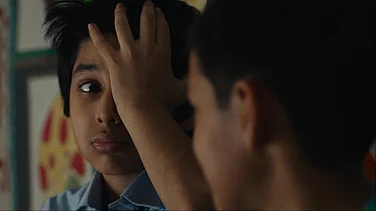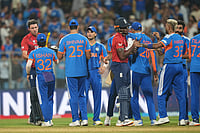When Tirthankar Poddar told his mother that he did not want a job anymore she broke down and cried. “I was in my late 20s,” says Poddar, now 47. His mother cried again a few years back, when he hired a former client as a management representative. “This time, though, it was tears of joy,” says the musician, who is popularly known by his stage name 2Blue.
For Poddar, the journey from a typical middle-class Bengali home in Agartala that prioritised a conventional profession like engineering or medicine to a career in music has hardly been smooth sailing. But in 2005, he had reached a critical juncture, where he had to take a call. “I had an opportunity to get a promotion at my job,” he tells Outlook. “And, I also had the opportunity to headline one of the biggest music festivals in the country. I thought: anyone can get a promotion. But not everyone can headline the festival.” The decision was made.
The black sheep
Poddar’s parents wanted him to pursue a safe career option. So, he graduated with a degree in mechanical engineering from the National Institute of Technology, Agartala, in 1997. And, in 2000, he got an MBA in Marketing and Systems, from the Institute of Technology and Management, Navi Mumbai.
But he knew he would be the black sheep of the family.
“Even as a child I knew that I would break the mould in my family,” he says. “And here I am.” While his childhood was not unhappy, he was always under pressure to become a topper in his class. “This allowed my parents to interact with others like them,” he says. Though he loved the performing arts, pressure from his parents made him choose engineering and later management.
“They said no one would give me a good job right after I became an engineer,” says Poddar. “I don’t blame them. We were from a small town. And, unfortunately, this is true.” His formal education, however, also helped him in performing arts. “Engineering got me started on this path,” says Poddar. “Subjects like marketing management and consumer behaviour that I studied in the management course broadened my horizon.”
Physics at play
Music is physics at play, opines Poddar. “It is about how vibrating bodies communicate. When the frequencies match, physicists call it resonance. Spiritualists call it the oneness of energies. I call it magic. It is this magic that convinced me to choose a career in music,” says Poddar, adding, “I have been a fan of physics as long as I can remember. The more physics you have the less engineering you need.”
Meditating on the impact the knowledge of sciences or business has on the humanities and vice-versa, Poddar says B-schools must have courses on liberal and performing arts. “They help in building empathy, a quality that is key in business leaders. Logic needs to
embrace emotion. The left brain needs to embrace the right brain. Else, B-schools and management colleges will produce well-trained robots with little or no emotional quotient. Co-curricular activities are vital, especially for leadership roles. Leadership is not only about profits—it is about people as well,” says Poddar.
Many hats
Poddar is not only a successful singer and musician but also a leadership coach. “There can be no leadership without empathy,” he says, adding that his experience in conducting leadership workshops has convinced him of the utility of humanities for management students. But it might be too soon to demand a radical change in the B-school syllabus. “As more and more innovators and disruptive educators come together, we will get there soon,” he says. B-schools should send well-rounded people into the world. The future rests on them.”
(This appeared in the print edition as "The Business of Music")






















